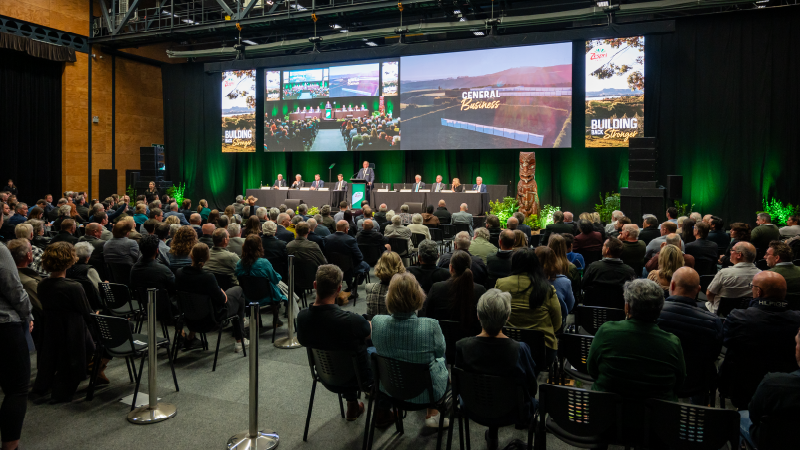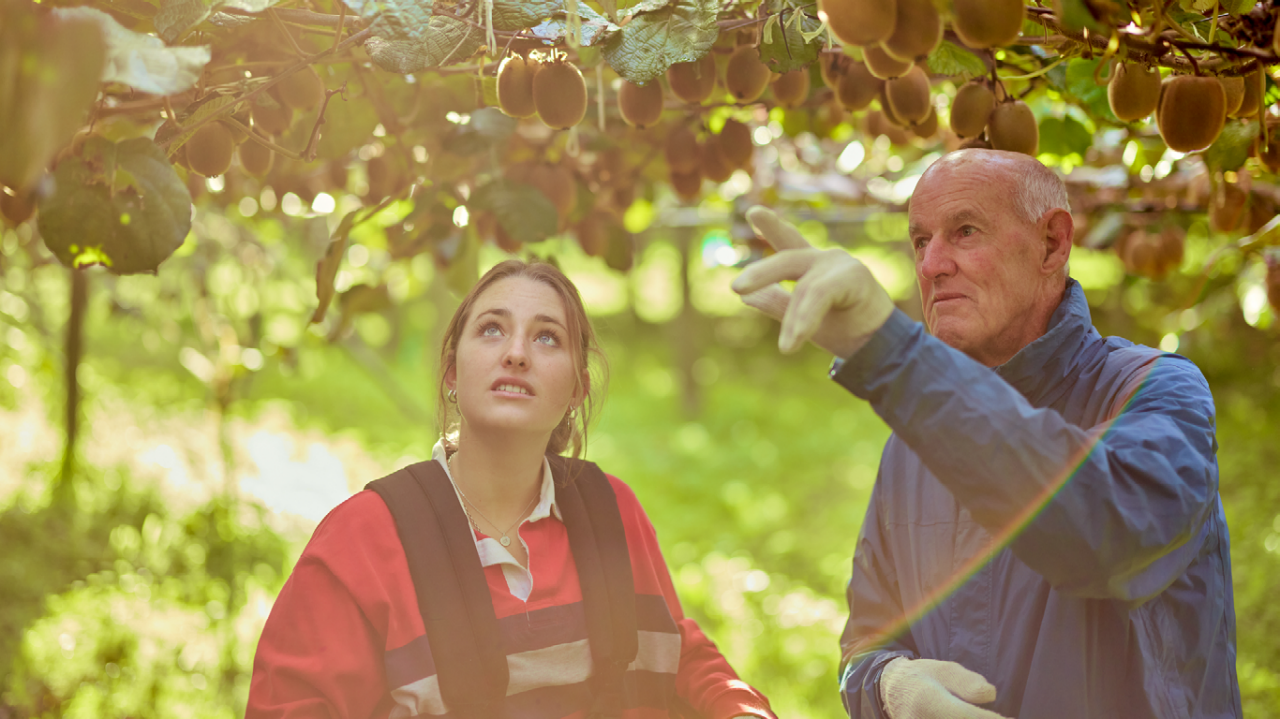Shareholder information
Here you’ll find information on ways to trade shares, dry and overshared shareholders, the annual meeting including voting and proxies, and forms to update shareholder details.
Ways to trade shares
You can buy or sell shares in two different ways:
On-market - shares are traded on a trading platform.
Off-market – shares are transferred privately between two parties, without using the services of a share broker.
Learn more about these processes here.
Growers who want to buy or sell shares off-market can now advertise on our Shares Availability Board.

Dry and overshared shareholders
Dry shareholders
A shareholder can be deemed dry if;
they have left the industry (sold their orchard or their lease has expired)
their orchard is no longer producing fruit for a number of years, or;
the Greenfield status on their orchard has expired after three years and there has been no production.
Dry shareholders who were dry prior to the constitution change on 14 March 2018 will have seven years before they stop receiving dividends, while shareholders who become dry after this date will have three years before dividends cease. All dry shareholders will be communicated with multiple times as they get closer to the end of receiving dividends.
There is no requirement for dry shareholders to sell their shares, however, dry shareholders are not able to vote on resolutions at our annual meeting. If a dry shareholder becomes a producer again their shares will no longer be dry and revert from a B class share to an ordinary share.

Overshared shareholders
A shareholder becomes overshared when their shareholding is higher than their entitlement. This can happen when:
they sell one of their orchards or one of their lease ends and the production from the remaining orchards exceeds the share cap;
the priority shareholder for the KPIN has a change in shareholding which impacts on the amount of shares the subsidiary holder can hold and results in the amount held being over the share cap.
the production on their orchard decreases over time.
Shareholders who were overshared prior to the constitution change on 14 March 2018 will have seven years before they must sell the overshared portion of their shares, while shareholders who became overshared after this date will only have three years to do so.
Overshared shareholders will be reminded at 12 months, 6 months, and 30 days of their sanction end date. If the shares have not been sold by the end date, Zespri can sell these on your behalf through our market maker.
Dividends
Our dividend pay-out policy is 70-90 percent of each years calculated distributable profit. Dividend payments will be paid annually which combines the final dividend (relating to the previous financial year) and the interim dividend (for the current financial year). However, it’s important to note that payment of dividends is not guaranteed and decision around if, when and how much will be submitted to the Zespri board for approval.
Imputation credits
Following the payment of dividends, Zespri frequently receives queries from shareholders about imputation credits, and why their dividend payment isn’t quite as much as expected.
Imputation credits allow shareholders to benefit from the income tax that Zespri has already paid. This means Zespri’s profits are not taxed twice when paid to the shareholder. A shareholder can use the imputation credit to reduce the income tax they have to pay on dividends they have received from Zespri.
Computershare calculate the tax payable on the dividend payment and withhold this for payment direct to the IRD which means the shareholder doesn’t have to do any tax calculations or IRD payments. The amount of tax withheld will be shown on your dividend statement which is sent by Computershare on payment date.
The Zespri investor relations team is happy to help with queries regarding your shareholding, entitlement and dividend payment, however we are not tax experts and we are unable to provide any financial advice to you. It is likely that you will be more successful going straight to your accountant with any queries.
Annual meeting

Shareholder voting information and entitlement
Our producer shareholders are eligible to vote on resolutions at our annual meeting. If your shares are owned by a company or other incorporated entity and you intend to vote on resolutions in person, you must appoint a proxy as the company cannot vote and therefore a representative need to be appointed to do this on behalf of the company. When shares are held by trustees, partners, or an individual only one person will receive the voting papers and can vote at the annual meeting on behalf of the trust, partnership individual entity.
A proxy can be appointed each year when Computershare sends out the notice of meeting, or you also have the option to appoint a standing proxy which lasts for five years and alleviates the need to remember to appoint a proxy every year. The standing proxy form can be found on the Annual Meeting page.
A Priority producer in the most instances is the landowner. If the KPIN has a Glasgow lease in place, the priority producer then becomes the lessee.
Share entitlement is calculated as 6 shares per 1 tray of average production (also known as the “share cap”). This calculation is provided for each KPIN. If multiple KPINs are owned by the same legal entity, then the share cap for each KPIN is totaled where the shareholder is the priority producer.
Priority vote allocation – Each priority shareholder (usually the landowner) is entitled to the lesser of (1) vote per tray of historical production or (2) one vote per share held for each priority KPIN. This is totaled across all priority KPINS.
A subsidiary producer in most instances is the lessee of the property. If a KPIN has a Glasgow lease in place, then the landowner becomes the subsidiary producer.
As the subsidiary producer of a KPIN, you are also entitled to be a shareholder of Zespri Group Limited shares. There are however some rules around being a lessee as you are considered a subsidiary holder and under a standard* lessee you are entitled to the subsidiary share entitlement. This is based on the historical production from the KPIN you lease. Instead of having all the share entitlement you are only eligible to the subsidiary entitlement which is the balance of the KPIN’s total entitlement (less the shares held by the priority producer which is typically the landowner) that is within the 6:1 share cap.
Subsidiary vote allocation – Each subsidiary shareholder (typically the lessee) is entitled to the remainder of any votes that have not been allocated to the priority shareholder (typically the landowner) following the same share allocation rules of (1) vote per tray of historical production and (2) one vote per share held. A subsidiary producer will receive the full voting allocation for their leased orchard where the priority (landowner) producer is not a shareholder.
Updating shareholder information
Updating trustees or partnerships
It’s important to keep us up to date if there are any changes in trustees or partner regarding the ownership of your orchard business. This is because unlike companies, shares held in trusts or partnerships are held in the individuals' names with the trust or partnership as a reference. Most changes to trustees or partners require an off-market transfer from the current holders to the new.
Example – KPIN 9999 is owned by the Smith Family Trust who have trustees called Sally Smith, Stuart Smith and Simon Smith. On the Certificate of Title it will show the names of the trustees. If Simon steps down as a trustee then his name will be removed off the Trust Deed, and the new trustees name (Suzy Smith) will be listed. The ownership of Zespri shares works the same way and we will need to move the shares into the new trustees of the Smith Family Trust which is Sally, Stuart and Suzy Smith.
The same logic applies for a partnership: when one partner is removed and replaced, then these details need to be updated.

Please note that where a trust or partnership is a dry shareholder and has a change of trustees, we won’t be able to update this on the share register, as the new trustees will be non-producers (who cannot purchase shares). Your options in this case will be to sell your shares on or off-market or retain the shares in the existing trustee names.
If you choose to do this, and when you do come to sell your shares, all trustees still noted on the share register will be required to sign the transfer form.
If you need to update the trustees or partners, you’ll need to provide us with relevant documentation such as:
Deed of Retirement and Appointment (trust only)
Certificate of title for all your KPINs.
Completed off market share transfer form. This needs to be signed by all current shareholders. Please provide us with Power of Attorney documentation if signing on behalf of someone.
In the case where a trustee or partner is deceased, please notify us when you’re ready so that we can start the process of either removing them from the shareholding or transferring the shares into the names of the executors of the estate.
Updating shareholder details
Computershare’s system is separate from our system. So if you want to update your bank account, IRD and tax details, elect to receive electronic communications or mailing address, you’ll need to complete Computershare forms to do so. Please let us know if you'd like these details to be reflected in our system as well.
Support
The Zespri investor relations team provides specialised support to the industry on everything shares related. If you have questions about shares or the share structure, please don't hesitate to ask. Email shares@zespri.com or call us on 07 572 6402.
Was this page helpful?